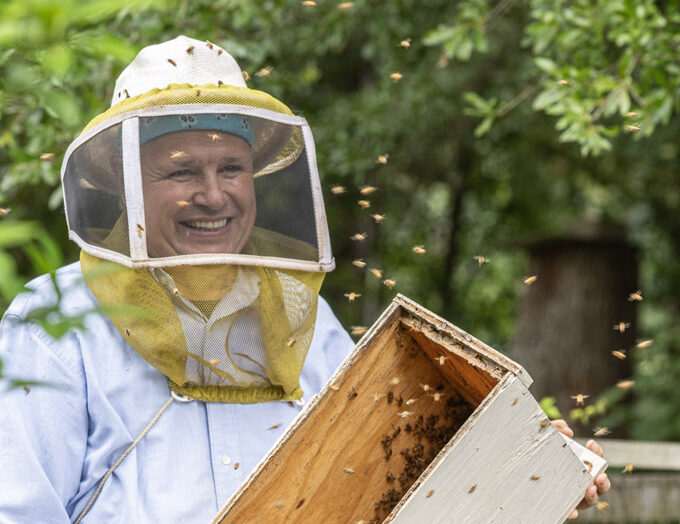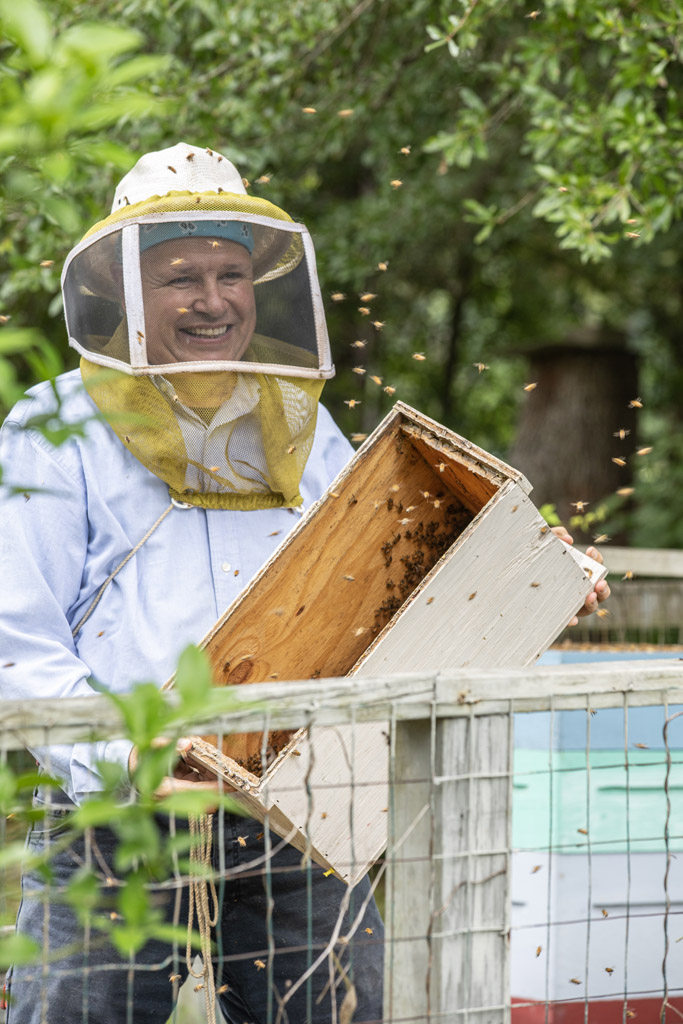
David Arnal gently removes the last remaining bees from the white box while transferring the hive to a larger “home.” These particular bees will be on display at St. Francis Catholic School in the near future.
Local beekeeper has protected bees and produced honey for 35 years
Through the power of information available to us nowadays and the spotlight on environmental issues, most of us realize the importance of bees to the wellbeing of mankind and to the health of our planet. Still, that awareness hasn’t much altered the looming threat to these humble garden creatures; their numbers are still declining, and the diversity of pollinator species is decreasing primarily due to the activities of humans. Intensive agricultural practices, loss of habitat, shifting weather patterns, pollution and the overuse of pesticides are all contributing factors to the ominous future of bees.
David Arnal, however, is a local beekeeper who has made it his life’s mission to care for and protect the local bees as well as increase their numbers, their opportunities to produce local honey, and importantly, the buzz surrounding his flower-loving, fuzzy friends. He has been keeping the bees at Hilton Head Plantation since 1996.

A bee smoker is used by Arnal to puff smoke into the hive when harvesting honey. The smoke doesn’t harm bees, it just interferes with their sense of smell so that they don’t react to alarm pheromones. As a result, the chance for a bee sting is reduced.
Arnal’s interest began, though, in 1988, while he was a 22-year-old college student at Clemson University. He was offered five beehives to care for as their previous keeper had passed away. He took the hives and was hooked.
Because there was no opportunity at Clemson to learn beekeeping, Arnal went on his own time to the University of Georgia to study with the one of the world’s preeminent beekeepers and researchers, Dr. Keith S. Delaplane, professor of entomology and director for the Walter B. Hill Fellow and Honeybee Program.
“I met with Dr. Delaplane at the UGA Extension Research Farms. He taught me so much and has become my beekeeping hero and mentor,” Arnal said. “But I tell everyone, I didn’t choose the bees; they chose me.”
Both of Arnal’s parents were Lithuanian, and while he was visiting there on an extended trip to meet family, he mentioned to his family that he was a beekeeper. “As soon as I told them I kept bees, they flipped out,” he said. “They said ‘Every Lithuanian family has a beekeeper! We knew we must have a beekeeper somewhere, and here you are. The bees chose you!’”
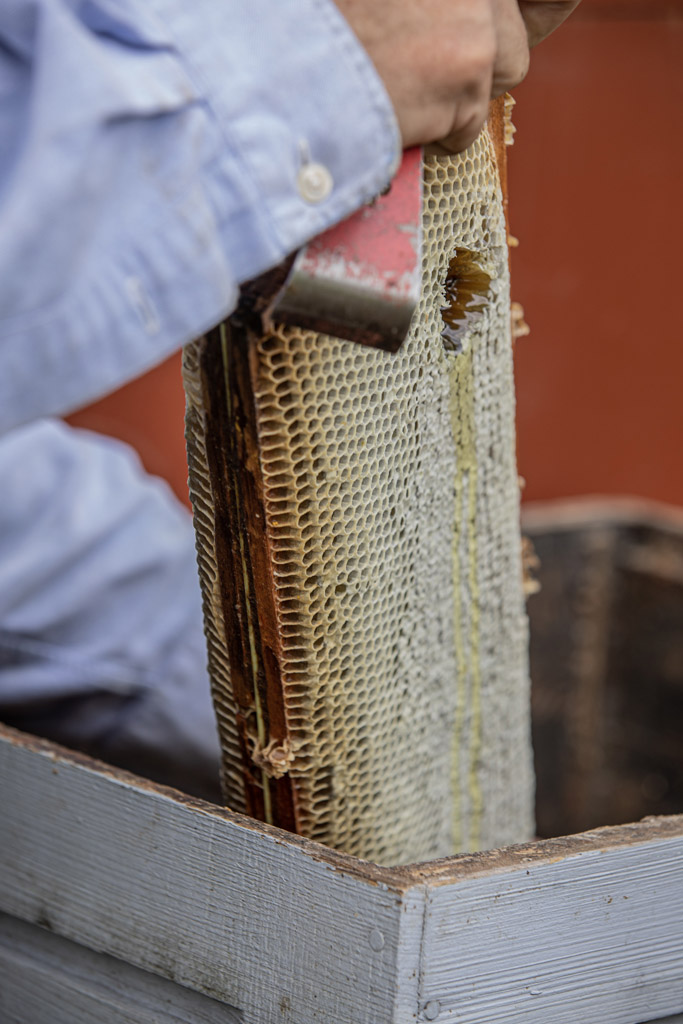
This honeycomb is dripping with nearly 12 lbs. of honey, ready to be harvested.
They also taught Arnal the adage that “bees don’t need people; people need bees.” People like to eat, and even if you don’t eat fruits or vegetables, your diet is reliant on honeybees. “Even if you only eat hamburgers, the cows that provide the hamburger meat are fed alfalfa hay that the bees pollinate,” Arnal explained.
As a student of entomology, Arnal has studied everything from bee reproduction to pollination to biology, even the effects of pesticides on honeybees. Because bees are considered livestock, they’re regulated by the government, and Arnal has the only USDA registered farm on Hilton Head Island. Every quarter, he is required to report the number of colonies he has, diseases, if any, and the amount of honey produced.
“The government is very concerned about the health and welfare bees,” he explained. “By monitoring all registered farms that manage honeybees in the United States, they can identify disease outbreaks whenever they occur.”
For example, if there is a problem in Texas or Colorado and it is not harnessed, but moves around, then the food supply will be affected. At a certain point, there will a lack of bees in that area to pollinate. Then the food supply is limited to wind-pollinated plants.
“We’d still get pecans from the trees,” Arnal said, “but no large quantities of grapefruit, apples, or oranges, etc. Honeybees are essential to the high quality of human life that we have on the planet right now. A world without honeybees would be a world that would be much more difficult to live in due to the scarcity of food. We’d have to subsist on a gruel-like diet of porridge and rice and other wind-pollinated plants. We definitely would not enjoy the current variety in our diet.”
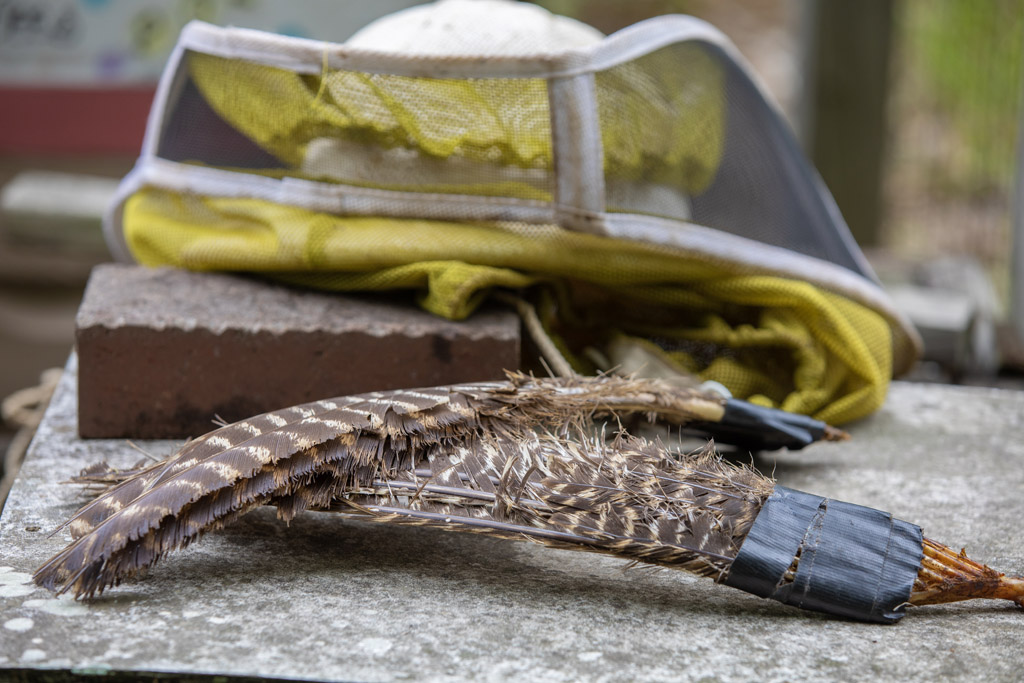
Tools of the Trade: A bee veil is generally worn while harvesting honey to protect the face from bee stings. These wild turkey wings are used to brush the bees off of the combs while the honey is being harvested. The tips of the feathers are used to gently remove them without harm.
Bees are also important detectors of bioavailability, or what kind of life can be sustained in an area. Most recently, when the Savannah Ports Authority wanted to dredge the Savannah River, they were sued by the South Carolina Coastal Conservation League who were concerned that heavy metals were going to poison the waters. Arnal proposed that he put a series of beehives every quarter mile for eight miles to the entrance of the harbor to determine bioavailability.
“Bees sample water, air, and soil better than any other organism,” Arnal said, “and by incinerating samples of bees after exposing them to an affected area, we could determine what metals they ingested, if any.”
Because bees have such a fine-tuned sense of smell (in their antenna), they are also used for other interesting purposes. The Defense Department and others train honeybees, using the Pavlov response, to detect explosives and drugs that dogs are unable to detect.
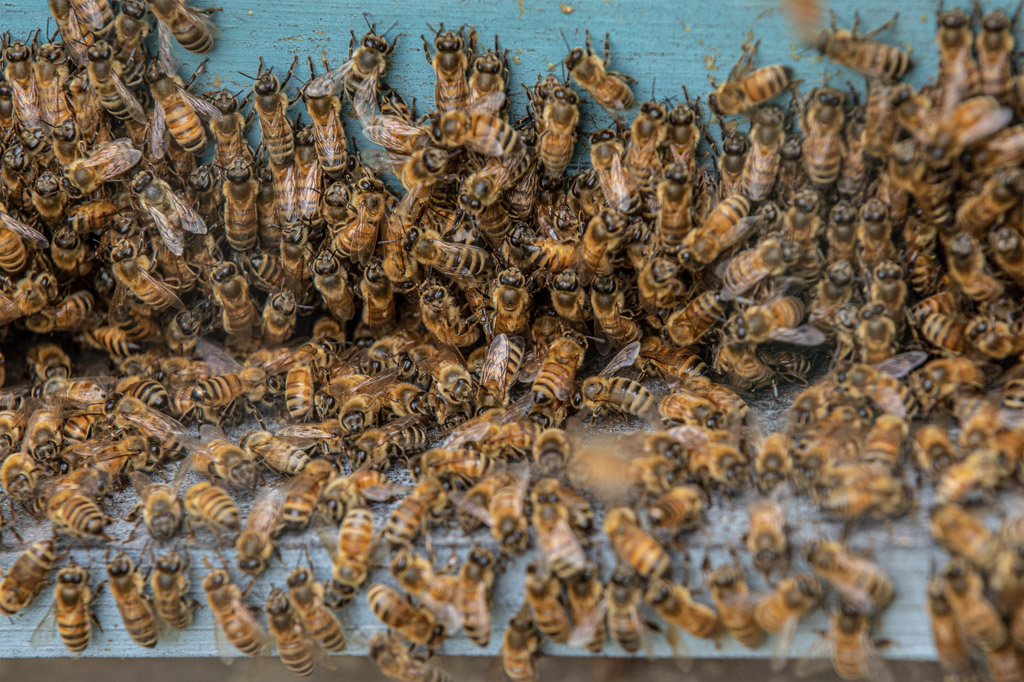
Bees swarm into their new home in Hilton Head Plantation, near the community garden plots.
“While a drug-sniffing dog can smell one part per billion, which is the equivalent of one drop of ink in a railroad tanker car full of water, a honeybee can smell one part per trillion, which is the equivalent of one drop of ink in a mile long train of water tankers,” Arnal explained.
On a sweeter note, though we may fear bees for their ability to sting, we love them for the honey they produce. Arnal’s Hilton Head hives average 45 to 55 pounds of honey per hive, per year, dependent on the weather, like any other produce.
“In Florida, where they have a longer growing season, they will average about 75 pounds per hive, per year,” he said. “But some beekeepers get greedy and take all the honey off their hive and then feed the bees sugar water, which doesn’t have the nutrients that honey has in it. I always leave my bees with plenty of honey for the winter. That way, they have real nourishment.”
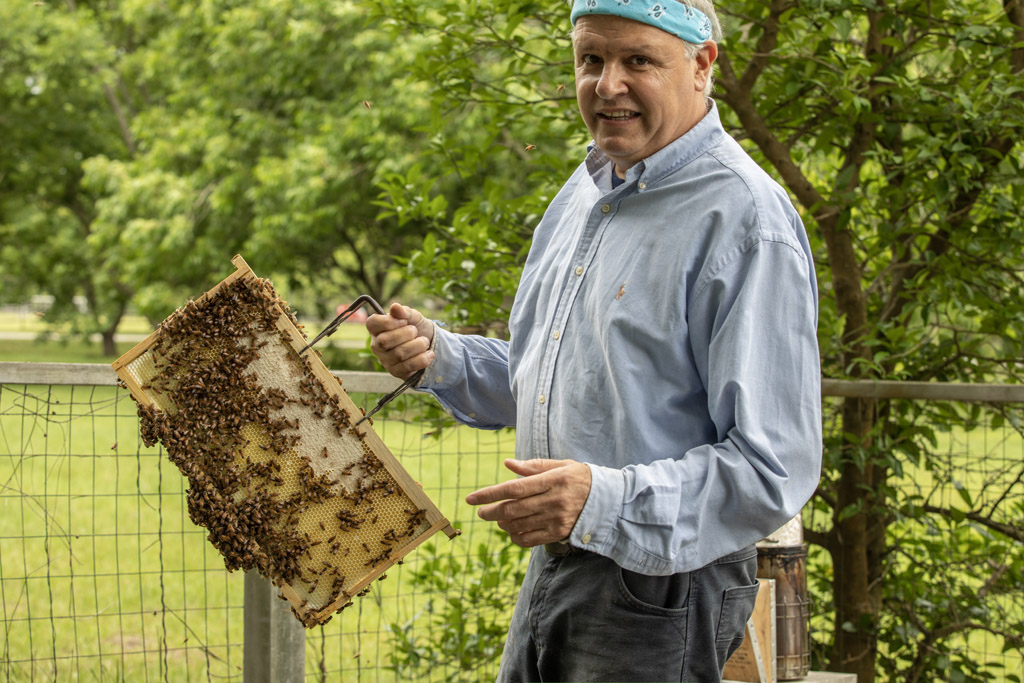
David Arnal and his employees, over 250,000 honey bees.
The real reason bees produce honey, according to Arnal, is so that during the winter when nothing is blooming, they can keep the queen warm. During winter, the bees effectively work their way very slowly as a cluster down the combs eating honey. The bees on the outside of the cluster drop their body temperature to the air temperature, take a bite of honey, vibrate their wing muscles, working to send the heat all the way into the center of the cluster where the queen is. When they start running out of honey, the worker bees move back to the outside of the cluster, rinse, and repeat.
“They do that all winter long and anytime its below 64 degrees,” Arnal said. “If a queen dies, the bees go into an emergency mode where they take one of the eggs from a very young larva and begin feeding it a different diet, because the only difference between a worker bee and a queen bee is their diet. The worker bee gets a high carbohydrate diet, while the queen bee gets a high protein diet. So, they build emergency queen cells to replace the queen. If not, the hive goes into a death spiral.”
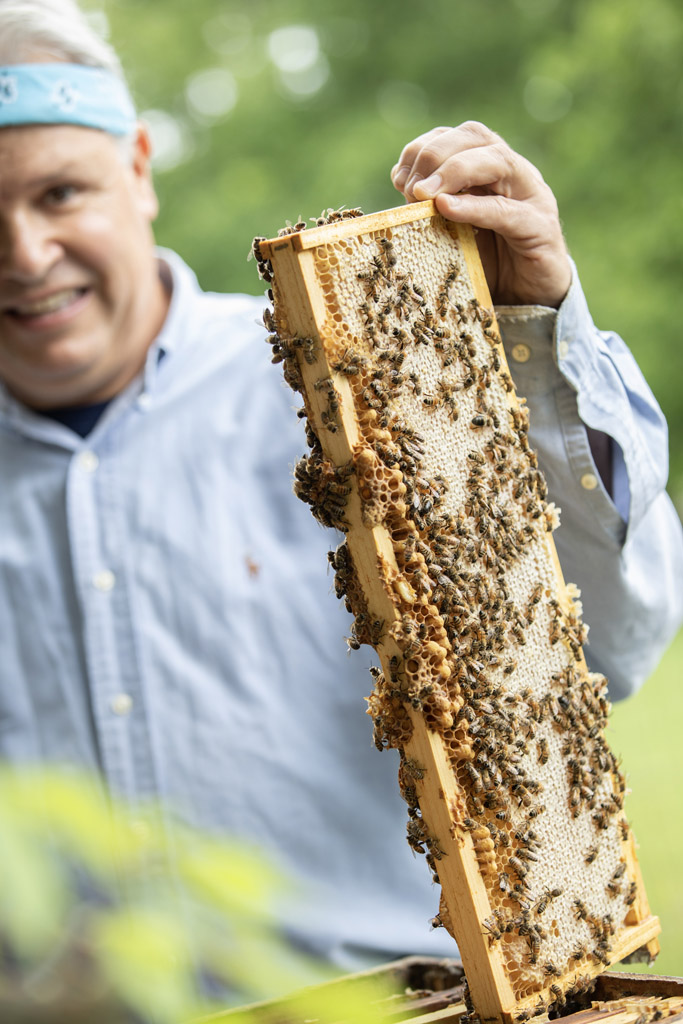
As the president of the Jasper Beekeepers Association, Arnal is passionate about sharing his extensive knowledge and experience with anyone who has an interest. Each spring, the organization, in partnership with Savannah’s Coastal Empire Beekeepers Organization, offers a beginners beekeeping course that is typically a one-day event. Participants learn the nuts and bolts of beekeeping and how to get started. The organization also holds monthly meetings at Honey Horn.
“People must have an approved location in mind to tend bees and harvest honey,” Arnal said. “You can’t just set up a beehive in your backyard. If you’re in a setting where there are covenants and restrictions that restrict livestock, you typically cannot have honeybees in your yard. For instance, in Hilton Head Plantation, you can’t put bees in your backyard. You must come here to the farm. For anyone who is interested in beekeeping and doesn’t have a location, we offer Honey Horn, where they can come on the weekends, and we teach them and help manage their bees.”
The group is on Facebook as Beaufort-Jasper Beekeepers or on the South Carolina Beekeepers Association website (scstatebeekeepers.com). The one-day class is $45, and the fee includes a book and lunch. For more information, call or email David Arnal at (843) 384-2803 or davidearnal@gmail.com.

